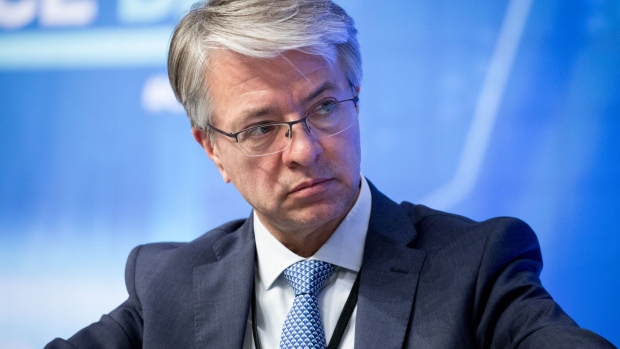Jul 30, 2021
BNP Profit Beats as CEO Bonnafe Rebuilds Equities After Losses
, Bloomberg News

(Bloomberg) -- BNP Paribas SA got a boost from lower provisions for bad loans and a rebound in equities trading last quarter, as Chief Executive Officer Jean-Laurent Bonnafe builds up the trading business.
Revenue from buying and selling stocks and derivatives more than doubled from a year earlier, the Paris-based lender said Friday. The gains were clouded by declines in the larger fixed-income business that mirrored the performance on Wall Street, as well as lower revenue from advising on deals and capital raisings. Net income rose 27% to 2.91 billion euros ($3.46 billion), beating analysts’ estimates as BNP set aside less money than expected for souring debt.
Bonnafe has rebuilt the bank’s equities business after steep losses last year on structured products that misfired in the market gyrations induced by the pandemic. BNP recently closed the acquisition of the stake it didn’t already own in Exane and expects to complete the takeover of Deutsche Bank AG’s prime services business by the end of the year. The CEO is betting stronger collaboration between the investment bank’s different units will help fuel growth.
While BNP rebounded from last year’s losses more quickly than its French peers, investment banking results have remained mixed, a trend that continued in the second quarter this year. Equities trading revenue of 757 million euros easily beat analysts’ 548 million-euro estimate. Fixed-income trading fell 43% from a strong quarter last year, in line with Wall Street but worse than the performance of European rivals such as Deutsche Bank, where the business declined 11%.
Highlights from BNP’s second-quarter results:
BNP’s corporate banking unit, which makes money from advising on bond or share sales as well as mergers, saw revenue fall 1.6%. At Switzerland’s UBS Group AG, by comparison, advisory revenue surged 68%. Wall Street dealmakers had some of their best performances on record, with the largest U.S. firms posting an average gain of 11%.
Helping offset some of the volatility in investment banking earnings, BNP also has a large retail network, divided into a European and an international business. Each contributes about as much in revenue as the investment banking unit, steadying earnings and allowing BNP to regularly return capital to shareholders.
The firm was among the hardest-hit when the European Central Bank imposed a de facto ban on dividends last year. It plans to pay a 1.55 cash dividend to investors when the ECB’s cap expires at the end of September, and will review its distribution policy early next year when it announces its new strategic plan.
Bonnafe has criticized the regulator’s restrictions and urged the ECB to assure investors that such restrictions aren’t likely to recur.
©2021 Bloomberg L.P.